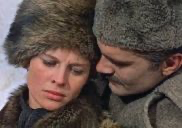Alone in a Room, Wearing a Mask
The following is from an interview with the writer and director Paul Schrader (“Taxi Driver,” “Raging Bull,” “Light Sleeper,” “First Reformed”) from the L.A. Times, September 13, 2020.
“ … over the years I’ve developed my own little genre of films. And they usually involve a man alone in a room, wearing a mask, and the mask is his occupation. So it could be a taxi driver, a drug dealer, a gigolo, a reverend, whatever. And I take that character and run it alongside a larger problem, personal or social. It could be debilitating loneliness like in ‘Taxi Driver.’ It could be an environmental crisis like in ‘First Reformed.’
 Julie Christie and Omar Sharif in “Dr. Zhivago”
Julie Christie and Omar Sharif in “Dr. Zhivago”“I’m looking for deep-seated problems, either personal or societal, and some kind of oddball metaphor. The more you get closer, you run these two wires next to each other, the more sparks you see flying across. And it’s in the sparks that the viewer comes alive. If the wires ever touch, there’s nothing left for the viewer to do. But if you keep these two wires really close to each other, the viewer will start to spark from one wire to the other. And that’s the greatest thing you can give a viewer or a reader, an opportunity to be part of the creation.”
I love analogies like this because they really help me as a writer.
When Mr. Schrader says “a man alone in a room with a mask on,” that strikes me as a different way of saying “get to true identity.”
“Man” of course means man or woman.
“In a room” means a contained dramatic environment.
“Mask” is false identity.
The story’s job is to get the mask off and reveal the hero’s true identity.
But I love the second part of Mr. Schrader’s construct even more—the idea of the “two wires”—the character’s story running side-by-side with a greater story but never quite touching.
I started thinking about Dr. Zhivago (even though it wasn’t written by Mr. Schrader but by Boris Pasternak, the novel, and Robert Bolt, the screenplay.)
The man in the mask is Yuri—Dr. Zhivago (Omar Sharif).
The room is Russia in the time of the revolution.
Yuri’s true identity (mask off) is that of a great poet, whose works and depth of sensibility transcend temporal upheavals, however monumental or Earth-altering.
The parallel societal problem is the White-Red clash that ended with the victory of the Communists and their idealistic, well-intentioned but in the end soul-destroying totalitarian worldview.
The central scene to me, if you recall it, is when Zhivago, seeking to flee with his family to their dacha in the countryside, is snatched up and dragooned by Red Army partisans under their ruthless commander Strelnikov (Tom Courtenay), whom Zhivago had known briefly in pre-revolutionary days as the unhappy student radical Pasha Antipov (who became briefly the husband of Lara [Julie Christie], whom Zhivago would come to love as well and for whom his greatest poetry would be written.)
The scene between Zhivago and Strelnikov takes place on Strelnikov’s armored high-speed train. It’s an interview, face to face, in Strelnikov’s office/cabin. The two men speak briefly of Zhivago’s poetry, which Strelnikov dismisses, not with contempt or ill will but simply as out of phase with the times.
STRELNIKOV
I should find it absurdly personal.
Zhivago is stung and even unnerved by this appraisal. To him, the personal is everything. Love. Depth of emotion. The imperatives of the heart.
STRELNIKOV
The personal life is dead in Russia. History has killed it.
See the sparks?
Paul Schrader is right. When you set a greater issue in parallel with a unique personal one, particularly one that involves the hero seeking his or her true identity, you get drama and magic and insight.
Zhivago’s life-odyssey (and his poetry) is a testament to the permanence of the personal … of love and of feeling … over the transience of “greater” political events, even if these produce massive societal transformation that, in truth, could not have been brought about in any other way.
Zhivago collapses and dies at the end of the story, post-revolution, dismounting from a streetcar in a moment of frantic passion, after spotting his great love, Lara, on the street and pursuing her as she walks past without seeing him.
YEVGRAV ZHIVAGO (ALEC GUINNESS)
The walls of his heart were like paper.
The story ends with the triumph of Communism and the conclusion (justifiably true) that such a brutal and heart-annulling mass movement was necessary to awaken Russia and bring her into the modern world. The final scene takes place in the control room overlooking a massive hydropower dam—a feat of engineering and construction that pre-revolutionary Russia could never have even dreamt of.
But who “won?”
In the end it is Zhivago’s poetry, speaking to the timeless Russian soul, that remains vivid and ineradicable, ever-alive in the hearts of the people.
Paul Schrader’s concept holds true.
Sparks did fly between these two parallels, didn’t they?
The post Alone in a Room, Wearing a Mask first appeared on Steven Pressfield.



